How Close Can Garden Ferns Be Planted In August
By Sarah Raven
I've set myself the task of giving you some stalwart reliable plants for the garden that only need minimal TLC. It sounds too good to be true, but with the right varieties, I promise that two hours a week is enough to give you
this ever-filling-cup style of gardening.
With these plants, as long as you cut above a pair of leaves rather than reducing a stem to the ground, picking (or live-heading) extends their flowering season. New buds will form between the main stem and the leaf below your cut, which develop into next week's flowers.
Planting this selection of winners now, once the frosts are over, will take a weekend. But once in the ground, a couple of hours a week picking and preening will be all they need.
One last thing: just to keep the weeds at bay, apply a 2cm-deep mulch of green waste compost from your local council (or similar) to the whole garden – then sit back and revel in what you've created.
Delighful dahlia
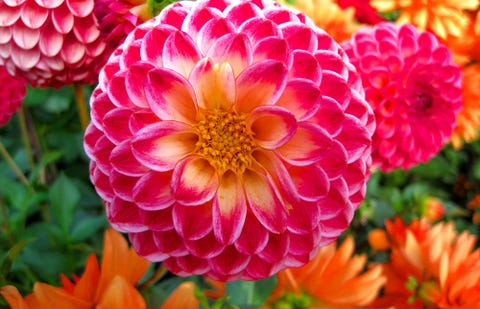
I have two favourite collections, one dark and rich, the other soft and pale. For a soft, curvaceous mix, plant Dahlia 'Labyrinth' with 'Burlesca', which both flower long and hard to the end of Autumn. Or choose a sumptuous velvet combination of Dahlia 'Purple Flame', 'Soulman' and 'Waltzing Mathilda'. These look lovely either in the garden or picked for a jug inside. Read the planting instructions carefully, then find them a sunny spot in some good soil with plenty of organic matter mixed in. Stake them once they start to grow properly (when they reach about 60cm) and then pick or dead-head once a fortnight.
MORE: 5 TIPS FOR A SMALL GARDEN
Simple sweet pea
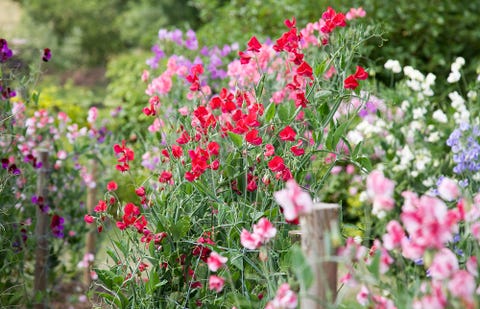
It's not too late for sweet pea planting – they are ideal for covering an arch or teepee. I always love pale Lathyrus odoratus 'Hi-scent' (left), purple 'Starburst' (centre) and the soft pink 'Anniversary' (right), which is a fantastic performer. I've recently discovered another couple of stormers, too – the navy 'Blue Velvet' and mauve 'Memories'. Classic sweet pea varieties are usually over by the end
of Summer, but not these ones, which reliably
keep going without attention and, of course, smell delicious, too. Just scatter plenty of potash-rich comfrey pellets over the soil as you plant them, then tie stems into their frame every couple of weeks.
Easy cosmos
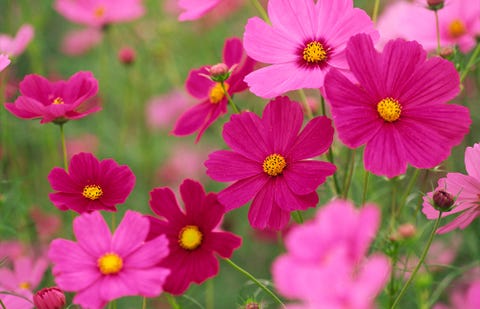
No garden is complete without its patch of cosmos. For maximum time-saving, don't bother to grow from seed – just order seedlings online or pick them up at a garden centre. My current favourite is the dark wine 'Rubenza' but there are more and more varieties to choose from every year. Cosmos require sun and good drainage – add a little grit to their planting hole. Don't place them too closely together as they will fill out, so space them 45cm apart. Then, like dahlias, all you need to do is stake them with a bamboo cane after three or four weeks, and just pick regularly to keep them flowering.
MORE: 27 INSPIRING SMALL GARDEN IDEAS
Shade–loving nicotiana
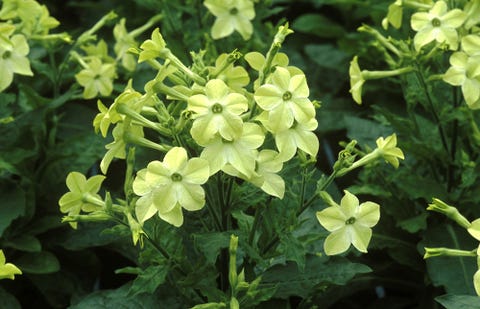
Instead of cosmos, if your garden is shady, go for Nicotiana sylvestis, with its elephant ear-sized leaves.
This is an annual that performs well in almost any position. I never believed this until I tried planting nicotiana in a shade border with Japanese anemones and foxgloves – it grew brilliantly, glowing at dawn and dusk and scenting the air.
Scented combination
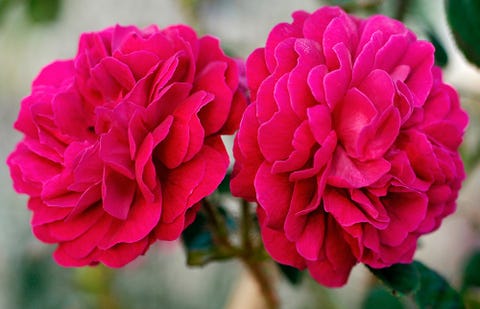
To achieve a display that looks good from late Spring to late Autumn with minimal TLC, I passionately recommend two long-flowering rose and salvia combinations. Try the Rosa 'Rhapsody in Blue' under-planted with Salvia 'Nachtvlinder', or the brilliant pink and highly scented Rosa 'De Rescht' surrounded by the matching Salvia 'Cerro Potosi'. Combining the salvia with the roses seems to keep the plants mildew and blackpot free, which means they are much lower maintenance. The roses are hardy perennials, so will get better year after year, and the salvias are
said to be tender, but mine have lasted outside now for four years without any Winter cover, so that makes them easy to look after.
MORE: HERE'S WHAT SPENDING AN AFTERNOON IN THE GARDEN DOES FOR YOUR MENTAL HEALTH
Edible plants
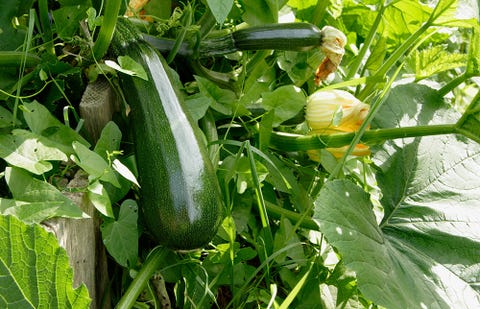
Add one edible plant to your list of must-haves. Grow a courgette collection of three different coloured fruits – a dark-green (such as 'Romanesco'), a pale-green ('Bianca') and a contrasting yellow ('Soleil'). As long
as you dig huge planting holes for them and add plenty of organic matter, they'll then flourish and give you endless homegrown food without much TLC.
Low-maintenance pots
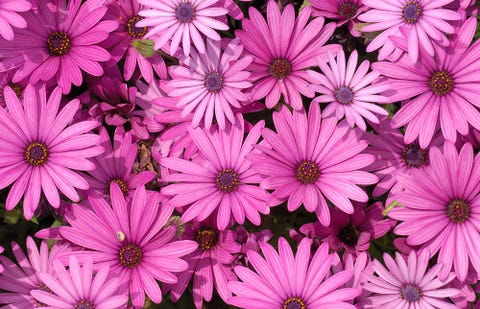
It's good to have some relatively low-maintenance doorstep pots planted with very long-flowering container combinations and I'd recommend cosmos for here, too. Mix the compact Cosmos 'Sonata White' with a classic osteospermum, such as the clumsily named but pretty flowered 'F1 Akila White Purple Eye'. Add a tumbling white annual Phlox '21st Century White' and you've got flowers to admire every day from June right through until November.
MORE: THIS IS APPARENTLY 2017'S BIG GARDENING TREND
Flowering perennials
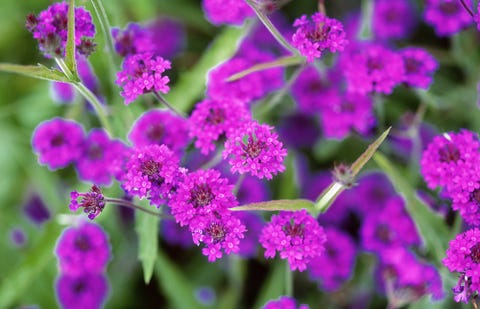
I'd also recommend planting some perennials now that flower in their first year for instant, easy impact. I love Agastache 'Blue Fortune', Verbena rigida and V. bonariensis, as well as Geranium 'Rozanne'. Each of these will be in bloom in a month or two and will then keep going for several more after that. Being perennials, they will reappear for many years, too – a handy characteristic.
Glorious gladiolus

Introduce some pots of the towering gladiolus, Acidanthera murielae. Its spear-like, bright-green foliage is great throughout the Summer, then exceptionally long-lasting, scented flower spikes take over for months in Autumn.
MORE:
Soft scents
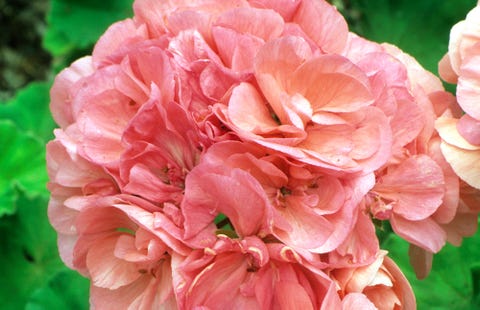
You could add a line of scented leaf pelargoniums by the path, too, selecting quick-growing, aromatic 'Attar of Roses', 'Cy's Sunburst' or 'Orange Fizz'. With these three, you can harvest their leaves for delicious teas and ice cream – and whenever you brush past, they release a wonderful fragrance, filling your garden with scent. In a sheltered spot, the tops of pelargoniums get frosted in deep Winter, but with the scorched foliage left on for protection until April, they survive and get bigger and better each year.
MORE: THE BIGGEST MISTAKE GARDENERS MAKE WHEN GROWING PEONIES
Like this? Subscribe to the Good Housekeeping newsletter.
This content is created and maintained by a third party, and imported onto this page to help users provide their email addresses. You may be able to find more information about this and similar content at piano.io
How Close Can Garden Ferns Be Planted In August
Source: https://www.goodhousekeeping.com/uk/house-and-home/gardening-advice/a568997/easy-planting-ideas/
Posted by: olsonsiblen.blogspot.com

0 Response to "How Close Can Garden Ferns Be Planted In August"
Post a Comment